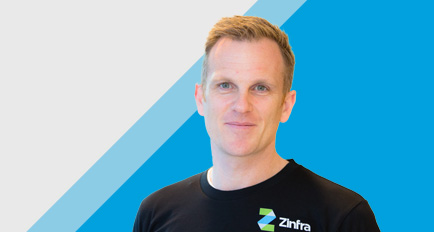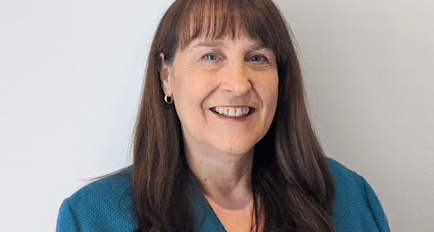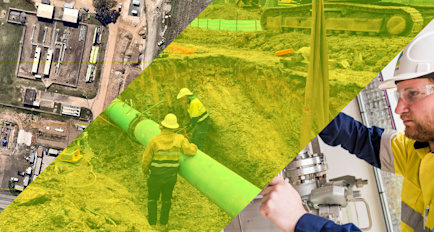Since joining the Zinfra Leadership Team in 2020, David O'Hara has worked to promote a people-focused growth strategy that lays a healthy foundation for profitability across the entire organisation.
Drawing on 15 years' experience across management and engineering roles in industrial construction, David has led cross-business initiatives at Zinfra that optimise project execution and delivery methodology – initiatives that have established Zinfra as a trusted partner for the future of the energy infrastructure sector.
When it comes to fulfilling Zinfra's role as a trusted partner to its customers in the energy industry, David has found that a clear strategy, shared by all, can do wonders.
"My view is that good strategies ought to be very simple, otherwise they're not executable," David said.
"If you try to tell a team of several hundred people a very complicated strategy, with lots of different components, you're going to lose them after two or three minutes."
David explained that while the Zinfra mission is to act as a trusted partner for the energy sector, the Zinfra strategy is very much focused on people and their safety, sharing a mantra of "Safety, then Profitability".
"Ultimately, to my mind, strategy is about achieving your objectives," David said.
To demonstrate this, David offered three key objectives that truly guide the Zinfra strategy: the objective of safety – to hurt no person; the objective of profitability – making a reasonable, sustainable, repeatable margin; and the objective of using the best people in the industry.
For David, being a trusted partner to industry flows naturally from the achievement of clearly defined objectives.
"If your objectives are clear - if you keep it really simple like that and communicate it like that to everybody – then everybody knows what you're about and can jump on the bus," David said.
"In order to be trusted, we need to be able to deliver on the commitments that we've made."
"Being a contractor makes this very simple, as your commitments are all listed down – it's just about delivering all the time."
The safety of people is our number one priority
When expanding on the idea that a trusted partner needs to always put the safety of people first, David revealed the far-reaching effects of this core value at Zinfra.
"Safety is our number one priority, full stop," David said.
"I have a firm view that it's people who make a business safe, not systems."
"You can override a system, but if your people have a safety mindset in them, you're going to have a culture of safety, and a culture of thinking safety first every time."
In this sense, the strength of all systems actually flows on from a culture of safety first embodied by people and their decision making.
Indeed, David stressed that while safety is often at the forefront of contractors at projects in the field, Zinfra's advantage is how safety first is recognised at an executive level.
"We are fortunate enough to have a business at Zinfra where at every executive level – from managing director to myself, but also at the operations manager level and beyond that – everybody has a safety first mindset," David explained.
"It's printed on our shirts – every single Zinfra shirt has safety first written on it, and that is a value that we live and breathe every day."
Indeed, David knows first-hand the value offered by a culture of safety, drawing on 15 years' work history that has taken him to major energy facility projects around the country in an Engineering, Procurement and Construction (EPC) capacity – from utility scale power stations, to wind farms and natural gas transmission facilities.
"We have an executive and senior management team that is genuinely focused on safety and, by and large, has actually come from the field or has spent significant time in the field – and I'm included in that."
"I've seen what can happen if it goes wrong, but I've also lived and breathed and acted in high-risk activities as distinct from just looking down on it from the tower."
Building an adaptable and connected workforce
By delivering a growth strategy that focuses heavily on the best outcomes for people, David understands how to truly build an adaptable workforce, from onboarding to career development.
"Our onboarding process has matured enormously over the past couple of years, to the point that we now have a formal structured process with two days of training for all of our new starters," David said.
"Some of this process is being implemented retrospectively, to make sure that everybody gets caught in the net.
It's evolved into a multifunctional, multidisciplinary, interactive session that happens within Zinfra projects and infrastructure, to ensure that everybody has the same onboarding and training, and nobody has any gaps in their knowledge as they're brought into the business from somewhere else."
For David, a socially connected workforce can be vital for improving work processes, staff mental health, and even empower staff to find the right role within the organisation.
"What we find is that by hook or by crook, people tend to interact in person," David said, explaining that he encourages people to ensure they interact with others on a regular basis.
"What I've found as restrictions have eased is it's easy to forget how useful those incidental conversations can be and how much value can be generated from those."
"I know it sounds nebulous or ill defined what that value means, but in terms of providing a solution in 10 minutes instead of 10 days of email exchange and misinterpretation – it makes an enormous difference."
For David, encouraging conversations is also critical for staff mental health.
"I'm focused on the mental health of some people who might be more vulnerable, ensuring that they have the opportunity to interact with people that could be avoidable by virtue of working from home – we get to a point where we ensure that everybody has interactions and we can keep an eye on one another as teammates."
Finally, David has also found that a people-first growth strategy and a socially connected workforce can be vital for ensuring individual adaptability.
"I often try to model how a career can develop and change," David said.
"We do move people from place to place within the business, and also from function to function within the business."
"And I consistently push the message to my team that if they want to seek an opportunity elsewhere in the business, then that's something that I will quite happily facilitate, in particular if it's going to make them a better leader, a better manager, a better functionary."
David's people-based growth strategy for Zinfra – grounded by values like safety first and the importance of communication – has set Zinfra up as a trusted partner for the energy sector, with clear successes including Zinfra's well-established culture of safety and its socially connected, adaptable team.




